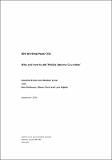| dc.contributor.author | Eyben, Rosalind | |
| dc.contributor.author | Lister, Stephen | |
| dc.contributor.author | Dickinson, Ben | |
| dc.contributor.author | Olivié, Iliana | |
| dc.contributor.author | Tejada, Luis | |
| dc.coverage.spatial | Jamaica | en_GB |
| dc.date.accessioned | 2014-06-20T17:05:20Z | |
| dc.date.available | 2014-06-20T17:05:20Z | |
| dc.date.issued | 2004 | |
| dc.identifier.citation | Eyben, R., S. Lister, B. Dickinson, I. Olivié & L. Tejada (2004) Why and how to aid 'Middle Income Countries'. Working paper series, 231. Brighton: IDS. | en_GB |
| dc.identifier.uri | https://opendocs.ids.ac.uk/opendocs/handle/20.500.12413/4070 | |
| dc.description.abstract | The amount of aid that flows to ‘Middle Income Countries’ (MICs) has recently been challenged and
some donors are shifting the balance of their aid so that more goes to poorer countries. Is there still a role
for aid to MICs and what should that role be? Drawing on cases from the Andean region and Jamaica, this
paper seeks to contribute to that debate within the current context of the Millennium Aid Consensus and
the new ways of working that include greater emphasis on country ownership and programmatic and
budget support. It concludes that, as aid as a proportion of GDP is usually modest in MICs, donors have
little direct leverage. Necessarily the role of aid must be to support the agenda of those local actors,
government or otherwise, who are working for the kind of change that a donor judges worthwhile.
If a ‘Middle Income Country’ has a track record of rapid improvement in the welfare of its
population, aid may primarily be justified to speed things up. Conversely, if no or little progress is being
made, aid may be justified because of the very lack of progress in poverty reduction that may be due to
deep structural inequalities and exclusion of much of the population. In this latter case it is suggested that
great care should be taken to ensure that commercial and political interests of the donor government do
not undermine the aid effort.
Good aid practice also needs to take account of the diversity among MICs, bearing in mind that the
classification system is very arbitrary, not locally owned and not integrated into regional or sub-regional
considerations and history. The paper concludes by questioning some of the current conventional
assumptions about the cost and benefits of donor coherence and coordination. | en_GB |
| dc.language.iso | en | en_GB |
| dc.publisher | IDS | en_GB |
| dc.relation.ispartofseries | IDS working papers;231 | |
| dc.rights.uri | http://www.ids.ac.uk/files/dmfile/IDSOpenDocsStandardTermsOfUse.pdf | en_GB |
| dc.subject | Aid | en_GB |
| dc.subject | Development Policy | en_GB |
| dc.title | Why and how to aid 'Middle Income Countries' | en_GB |
| dc.type | IDS Working Paper | en_GB |
| dc.rights.holder | Institute of Development Studies | en_GB |
| dc.identifier.koha | 148848 | |

